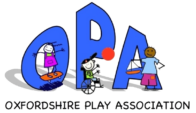Play Types
Over the years, many people have documented a number of different play types which provide us with a common language for describing aspects of play. They can be a useful tool for looking at play provision, and are not intended to be used to direct children and young people’s play.
- Symbolic Play – play which allows control, gradual exploration and increased understanding without the risk of being out of one’s depth.
- Rough and Tumble Play – close encounter play which is less to do with fighting and more to do with touching, tickling, gauging relative strength. Discovering physical flexibility and the exhilaration of display.
- Socio-dramatic Play – the enactment of real and potential experiences of an intense personal, social, domestic or interpersonal nature.
- Social Play – play during which the rules and criteria for social engagement and interaction can be revealed, explored and amended.
- Creative Play – play which allows a new response, the transformation of information, awareness of new connections, with an element of surprise.
- Communication Play – play using words, nuances or gestures for example, mime, jokes, play acting, mickey taking, singing, debate, poetry.
- Dramatic Play – play which dramatizes events in which the child is not a direct participator.
- Deep Play – play which allows the child to encounter risky or even potentially life threatening experiences, to develop survival skills and conquer fear.
- Exploratory Play – play to access factual information consisting of manipulative behaviours such as handling, throwing, banging or mouthing objects.
- Fantasy Play – play which rearranges the world in the child’s way, a way which is unlikely to occur.
- Imaginative Play – play where the conventional rules, which govern the physical world, do not apply.
- Locomotor Play – movement in any or every direction for its own sake.
- Mastery Play – control of the physical and affective ingredients of the environments.
- Object Play – play which uses infinite and interesting sequences of hand-eye manipulations and movements.
- Role Play – play exploring ways of being, although not normally of an intense personal, social, domestic or interpersonal nature.
- Recapitulative Play – play that allows the child to explore ancestry, history, rituals, stories, rhymes, fire and darkness. Enables children to access play of earlier human evolutionary stages.
This play types list was devised by Bob Hughes, and are published in full in his ‘A Playworker’s Taxonomy of Play Types’.
